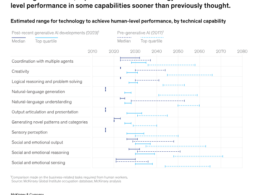the health strategist
platform
the most compreehensive knowledge portal
for continuous health transformation
and digital health- for all
Joaquim Cardoso MSc.
Chief Research and Strategy Officer (CRSO),
Chief Editor and Senior Advisor
December 8, 2023
What is the message?
After a year of facing competition in the artificial intelligence (AI) space, Google has launched Gemini, a family of large language models, to counter the dominance of ChatGPT from OpenAI and Microsoft’s utilization of OpenAI’s models.
The release of Gemini aims to strengthen Google’s position in the AI landscape, challenging existing models and potentially paving the way for new AI-driven services.

One page summary
What are the key points?
Gemini vs. ChatGPT:
Google’s Gemini family comprises three models – Pro, Nano, and Ultra. The Pro version directly competes with OpenAI’s GPT-3.5, positioning Google to reclaim ground lost to ChatGPT in the generative AI domain.
Market Positioning:
Gemini Nano is designed for mobile devices, potentially competing with models like LLaMa 2. The top-of-the-line Gemini Ultra, expected in early 2024, aims to rival or surpass OpenAI’s GPT-4, indicating Google’s commitment to making generative AI a more practical tool for everyday use.
Distribution Advantage:
Google plans to integrate Gemini into Chrome, which commands over 60% of the browser market. This strategic move grants billions of web users instant access to Gemini’s capabilities, enhancing its market reach and potential impact.
Uncertainty around OpenAI:
Google may benefit from the uncertainty surrounding OpenAI, especially after the recent leadership shakeup. Businesses relying on OpenAI’s models might explore alternatives, and Google aims to position itself as a viable option.
Multimodal Capabilities:
Google emphasizes Gemini’s “multimodal” design, enabling it to comprehend not only text but also images, video, and audio. This feature positions Gemini to handle real-world situations that involve multiple senses, potentially setting it apart from competitors.
Reasoning and Planning:
Gemini’s touted reasoning and planning capabilities suggest the potential development of personal assistants capable of tackling complex problems and formulating action plans. This could lead to AI-driven agents, such as a shopping assistant handling both product discovery and payment.
What are the key statistics?
- Chrome, with over 60% of the browser market, will incorporate Gemini, extending its reach to billions of users.
- The Gemini Ultra model, set for release in 2024, holds Google’s main hopes for competing with or surpassing OpenAI’s GPT-4.
What are the key examples?
- Gemini Pro competes directly with OpenAI’s GPT-3.5, targeting a comparable market segment.
- Gemini Nano is designed for mobile devices, potentially competing with models like LLaMa 2.
- Gemini Ultra, with advanced features, aims to outpace OpenAI’s GPT-4 in the race for practical generative AI applications.
Conclusion
The release of Gemini signifies Google’s strategic response to the AI landscape, aiming to regain ground lost to competitors like OpenAI.
With a focus on distribution, multimodal capabilities, and advanced reasoning, Google positions Gemini not only as a competitor but as a potential pioneer for the next breakthrough AI services, intensifying the AI battle in 2024 and beyond.
DEEP DIVE

This summary was written based on the article “Google pins its hopes on Gemini to leapfrog GPT-4”, published by Financial Times and written by Richard Waters on December 7, 2023.
To read the original article, click here.











